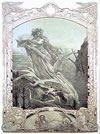Friday
This is the only day of the week named for a female deity, in the major European languages. In the Latin-based languages, the name for Friday is derived from the Roman goddess Venus, e.g vendredi (French) venerdi (Italian). In those langauages, including English, where the days are called after norse/germanic deities, Friday belongs to the goddess Freya. Freitag (German) Vrifdaag (Dutch) Fredag (Swedish and Danish). Wikipedia suggests that her name means "woman" (the German Frau for example.)
Freya
Some of Freya's attributes were shared with Venus. She was a goddess of love and fertility, the most beautiful goddess and brings the most favourable fortune. There are, however, many attributes of Freya which are quite different from Venus's, such as her being a goddess of war and magic. This may reflect the differing status of women in Northern and Southern Europe. Wikipedia suggest she is closer to the Mesopotamian Ishtar than to Venus.
 In Norse mythology, she was the major goddess of the Vanir race - the nature deities who were opposed to the warrior gods of Aesir (Odin, Thor and others). She was patron of crops and love and was fond of music, flowers and elves. Encyclopedia Mythica She and her brother Freyr were described as " fair of face and mighty" in the prose Edda. (Wikipedia )
In Norse mythology, she was the major goddess of the Vanir race - the nature deities who were opposed to the warrior gods of Aesir (Odin, Thor and others). She was patron of crops and love and was fond of music, flowers and elves. Encyclopedia Mythica She and her brother Freyr were described as " fair of face and mighty" in the prose Edda. (Wikipedia )
Her magical possessions are the necklace Brisingamen - that she got by sleeping with four dwarfs - and a cloak of bird feathers - that lets her change into a falcon. Her chariot is pulled by two cats. She has a battle boar called Hildesvini, who is her disguised human lover. Among her magical qualities, her tears turn to gold. Her palace is called Folkvang (field of folk) and her hall is Sessrumnir. Dead women and half of the warriors killed in battle go to her hall. (The rest go to Valhalla with Odin.)
There are several names by which Freya was known throughout the Norse, Saxon and germanic territories. The similarity of her name to other Northern European goddesses causes more problems. It is particularly difficult to distinguish Freya from Frigg, the main goddess of the Aesir, as some germanic and norse peoples recognised only one or the other. It may be that Freya and Frigg were the same goddess in some places where their worship was determined through custom, while in the more formalised pantheon found in the Edda, they represented the chief goddesses of opposing tribes of Gods.
 (Wikipedia refers to discussion over the distinction in Davidson, H E. (1998) Roles of the Northern Goddess, London: Routlege. Grundy, S, Freyja and Frigg,; Nasstrom, B-M. Freyja,a goddess with many names, in Billington, S & Green, M (Eds.) (1996). The Concept of the Goddess. London: Routlege. Welsh, L. (2001). Goddess of the North, York Beach: Weiser Books)
(Wikipedia refers to discussion over the distinction in Davidson, H E. (1998) Roles of the Northern Goddess, London: Routlege. Grundy, S, Freyja and Frigg,; Nasstrom, B-M. Freyja,a goddess with many names, in Billington, S & Green, M (Eds.) (1996). The Concept of the Goddess. London: Routlege. Welsh, L. (2001). Goddess of the North, York Beach: Weiser Books)